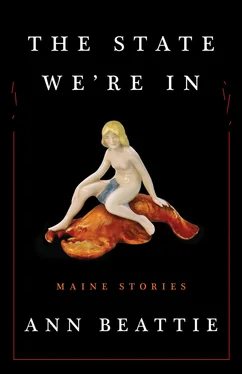Dear Clair (if I may), Thank you for the quick reply. I’ll be attending my goddaughter’s graduation from Bowdoin in early June, and if you could see me on either side of that — the 5th or 7th would be ideal — I would be grateful for a little of your time. If you’re so inclined, and there’s somewhere you like to have lunch, it would be my pleasure to have a meal together. I do understand how busy you must be, however — so even a glass of water and a few moments of conversation will be fine! Thank you again for getting back to me so quickly. All best, Terry.
Terry — the 7th is good, though there may be some banging because of a new sink being installed in the upstairs bathroom. Tell me approximately what time to expect you, so I will not be running an errand. Again, I hope that my very few recollections about Capote are not a disappointment, but you’ve been warned! With best wishes, Clair.
Noon, Clair, so I might take you to lunch? Anticipating meeting with great pleasure. Best, T.
Terry — I will look for you about noon. Dockside is a restaurant near the water that I sometimes go to, though lunch tends to be a meal I forget. And breakfast consists mostly of vitamins. Though perhaps it would be good to have a bit of midday fuel. It is slightly tricky to find, so come to the house and we’ll go together. Do you need any driving instructions? Best wishes, Clair.
My GPS should get me there. Until then, T. Anticipating with great pleasure.
Terry — I won’t send this letter, though sometimes it’s good to write something and tear it up, since the simplest things one wants to write just dissipate into words that sound good and have a logical configuration on the page, yet don’t really communicate what I want to say. Do you already know that Capote visited us, and are you expecting his essence might be indelible, even if — assuming you’re like other writers and photographers I know — you have no mystical beliefs? He peed in the toilet upstairs across from what will be the new pedestal sink. He may have done more than pee — that might be why he went upstairs, rather than using the downstairs half bath. Would it be amusing if I dithered aloud about this to you, a bit nervously, wanting to ingratiate myself, as the old do with the young? Or should I make an attempt to take your subject seriously and not conduct myself for my amusement? We must not talk of toilets at all, but of how good the fish chowder is, or how lovely the lobster salad (which I’ll probably not order, since the days of lavish expense accounts are over). Chances are we’ll never meet again but instead have some little flutter of follow-up on some minor point, and at Christmas I suppose you could astonish me by sending an unintentionally bizarre floral display with glittery pinecones protruding like enormous hatpins. My resentment of the young drips into everything I say, I fear — I, too, am a leaking sink. What it costs to install a sink nowadays! But I’ll save that for hectoring the repairman. No one thinks Capote was a major talent any longer. Now everyone is a prodigy. No one even knows the names of the most serious contemporary writers unless they’re local “celebs” who come out to eat organic cheese on hand-hewn toothpicks to benefit some do-good organization. I was once in a car when the GPS registered “CR” as CRESCENT, rather than CIRCLE. It turned out there was a CRESCENT (in New York State!) in some built-yesterday housing development, and there we were, the driver and me, at the wrong address for the B and B at nearly midnight. It’s good you’re Anticipating with great pleasure, because like all old people I fear the future (An’ forward, tho’ I canna see, I guess an’ fear). The sound you hear is paper ripping, Terry of the genteel manners.
Adver had not come to install the new sink, just as she’d suspected he wouldn’t. He had no phone. He was probably hungover. He often had the “flu.” He would show up eventually, and she’d begun to enjoy brushing her teeth in the shower, so what did it matter? Better that the house be quiet for their conversation.
Across the street she saw the bushes, slightly greener than the day before. This intermediate stage was not her favorite. In certain light, she liked to photograph the tangled branches with the iPad, whose camera was the only one she had anymore. All of Demeter’s things had been donated to the Maine College of Art, where he’d guest-lectured the last few years of his life. Eight days from diagnosis to death. No memorial service, as he’d requested. Instead, she’d bought half a dozen kites and given them to the front desk clerk, who handed them out to children staying at the Stage Neck Inn — the hotel right above the beach. She’d sat in the bar having a glass of wine with her friend Barb Gillicut, still in shock the weekend after Dem’s death, watching the surprised children lean like cats stretching their paws on the thighs of their fathers, who prepared the kites to be sailed. Eventually a sumo wrestler flapped by with Silence of the Lambs teeth and contorted mightily in the wind before crashing to the sand. Unlike balloons, no kites simply drifted away as she watched, sharing a second glass of wine with Barb, aware that the bartender had her eye on them and was drying glasses like a Gypsy having a manic fit over a crystal ball, simultaneously polishing and trying to appear disinterested.
Dem was long dead. Dead for years and years. She herself was seventy-four. If he’d lived, he would have been eighty-eight. The Stage Neck now employed a female bartender, who therefore undoubtedly worried less about the mental state of other women. She picked up a crumpled bag in the road. Any car turning onto the street might be Terry in his rental car, which might be either white or red, as rental cars tended to be. All other cars were silver.
How had she ended up here? She was a Virginia girl. Virginia, where spring came a month and a half earlier than it did in southern Maine. In Virginia the problem was bees. In Maine, blackflies and mosquitoes. Well — the problem with bees now was that they were dying. It was a very bad situation. One Dem would have worried about incessantly, pointing out every terrible thing that would arise due to the death of the bees. He would have made photographs of dead bees, and eventually — when the moon no longer appeared at night, or something equally dire — his photographs would be shown at MoMA. Eventually one would be sold at auction in New York City and a framed print of a dead bee would be hung above the marble-topped table of a discerning, socially correct, environmentally anxious couple in Park Slope, so they’d have an expensive little altar of sadness, the photograph taking the place of Christ on the cross, the table an old-fashioned, humble altar that sometimes might feature the perfect still life of our times (of course minus flowers or fruit): a key ring and a Binky and a bottle of Klonopin and an unopened Dasani water.
Red. An unpleasant maroon shade, like menstrual blood. Better, though, than a screaming fire-engine red. So many things going on in the car: a wave; a hand flipping the sun visor back into place; the side window rolling down, then rising again, finally all the way down to allow for an awkward first handshake. Terry wore rectangular glasses with heavy black frames that magnified his eyes and called attention to his facial asymmetry, one eye larger than the other. Brown eyes. Slightly thinning brown hair. Nervous hands: smoothing his hair, dropping the keys, snatching them up again, a sort of stammering dance in the driveway as he wondered aloud about locking the car. He reached back in for his notebook and cell phone, which he slid into the pocket of his sports coat.
She preceded him up the walkway, not wide enough for two at a time (one of Dem’s complaints). She imagined that Terry, behind her, was sneaking a last, quick look at the phone. A robin hopped across the lawn. There was a nest in the climbing rose.
Читать дальше












